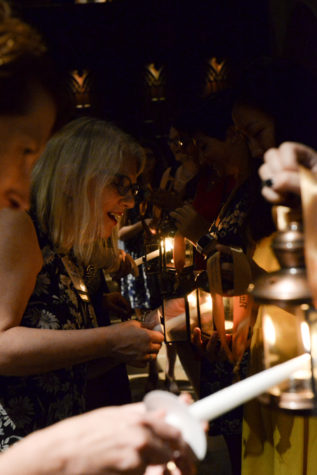Lantern night shines a light on women’s education
Approximately 1,300 young women walked down the center aisle of Heinz Chapel Sunday night, clutching gold Pitt ribbons in their hands. Glass and metal lanterns with small white tea candles inside dangled at the ends.
Joye Karidis, who graduated from the Dietrich School of Arts and Sciences in 1986, saw why this event is so important for new students.
“I think tonight is symbolic of the beginning of their journey at the University of Pittsburgh,” Karidis said.
Karidis was one of several Pitt alumnae acting as flame bearers — the mothers or grandmothers of the first 38 of the female first-year students to register for the night who could light their daughter or granddaughter’s candle at the ceremony before lighting the rest of the incoming students’ candles.
Each lantern lit at Pitt’s 98th Lantern Night symbolized the passing of knowledge to the younger generation of women.
Lucinda Currie, a 1992 alumna from the Joseph M. Katz School of Business, noted this symbolism as she lit her daughter Isabella Currie’s candle.
“It’s the passing of the light. It’s taking your light and sharing it with another student, whether that’s your daughter or another student, and giving them a memory they can treasure,” Currie said.

Women at Pitt first began celebrating Lantern Night, the oldest tradition at Pitt, in 1920. The Alumni Association hosted the event, aided by the Alumnae Council and Blue and Gold Society. The Pitt Men’s Glee Club sang at the end of the event and a reception in the Alumni Hall Connolly Ballroom followed. The event included several speeches from members of the Pitt community, including Chancellor Patrick Gallagher, Alumni Association President Lisa Golden and master of ceremonies SaLisa Berrien.
Gallagher gave the third speech to attendees, highlighting women’s importance in Pitt’s history. He mentioned two women in particular who inspired that first lantern night — Margaret and Stella Stein, namesakes of the on-campus gift shop Maggie and Stella’s. They were the first female undergraduate students in 1895 at the Western University of Pennsylvania — Pitt’s former title — and went on to become educators themselves.
“It celebrates the spark of scholarship that the Stein sisters lit over a century ago, and one that is still burning brightly at the University of Pittsburgh today,” Gallagher said. “So tonight, we celebrate the beginning of your academic journey as well as the pioneers who paved the way before you.”
Though he couldn’t attend the preceding reception, Vice Provost and Dean of Students Kenyon Bonner said he looks forward to the event every year because of the symbolism of passing on wisdom and knowledge.
“Women are human beings, first and foremost. We are all human beings, when we talk about diversity and inclusion, we talk about everyone, every human having a right and ability and capacity to contribute to the world,” Bonner said. “So women, men, black folks, international community are all important to this and I think [lantern night] symbolizes that and allows us to reflect on the journey of women in higher education … and women throughout the history of our world.”
Karidis discussed why she and her daughter came to Lantern Night.
“For me, I feel like it’s an honor just to be invited to light for these freshmen girls to start off their education,” Karidis said. “It’s an exciting time for them.”
Her daughter, first-year Zoe Karidis, said the event was important because of the Pitt unity it brings to first-year and transfer women.
“I think it’s great because there are so many people here, like Pitt is such a big school so it’s really nice that all the girls, especially freshmen girls, can come together and all be in one place at the same time,” she said.
First-year Isabella Currie said the tradition reassured her that Pitt would make a fine new home.
“Even as a student touring here when I wasn’t even sure where I was going, [people at Pitt] were instantly trying to make me feel like part of the Pitt family,” Currie said. “I think that this is one of the many traditions, like my mom said, that Pitt works hard towards making you feel at home.”
Ian Currie, husband and father to Lucinda and Isabella respectively, said from a father’s perspective, he was proud of the bond that his wife and daughter were making.
“But I’m even prouder to know that I have an independent daughter who is thinking high-level and wants to be a contributor, and especially in a male-dominated industry, I know she is going to be able to stand confidently with what Pitt provides and what we have provided as parents, which is stand up, be strong and go forward,” Currie said.

